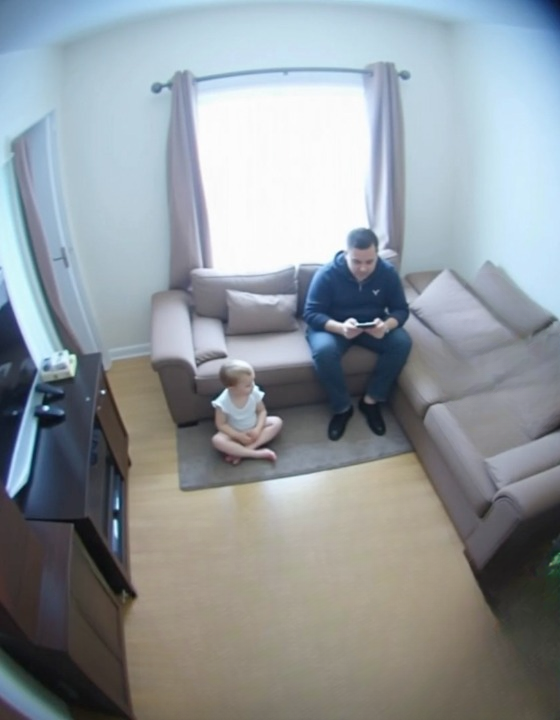Introduction: When Everyday Life Reveals the Unexpected
Every family has its private world—the laughter shared in the living room, the small disagreements in the kitchen, the quiet bedtime stories that make a house feel like home. Yet sometimes, life inside those four walls is not as simple as it looks from the outside. What seems ordinary can suddenly transform into a moment that changes everything.
I never imagined that a single recording would alter the way I viewed my marriage, my family, and even the very foundation of the life I thought I had built. But one evening, while reviewing footage from a small security camera I had installed for safety reasons, I saw something that shook me to my core. It wasn’t an accident or an intruder—it was a reflection of someone I thought I knew best: my own husband.
This is not a story of blame or condemnation. It is a story of awakening, confrontation, and rebuilding. It is a reminder that even in the closest relationships, we may discover truths that force us to grow, to change, and to heal.
An Ordinary Evening That Changed Everything
The night began like countless others. My husband sat on the couch, phone in hand, scrolling absentmindedly while our little girl played with her toys on the carpet. The warm hum of family life filled the room. Nothing seemed unusual.
But within seconds, the peaceful moment shifted. His voice, usually calm, carried an edge I wasn’t prepared for. He seemed frustrated—an emotion that grew sharper as our daughter continued to play, scattering toys across the floor in her usual, innocent way.
At first, I thought it was nothing more than a tense reaction after a long day at work. But the scene played out differently than I had expected. His words grew firmer, his tone colder, and our daughter froze. Her wide eyes showed confusion, not defiance.
What startled me most was her expression—a mix of fear and sadness. She wasn’t being mischievous. She was simply a child, exploring her world with toys and giggles. And yet, in that moment, it was as if her playfulness had been misunderstood.
I sat there, staring at the recording, my hands trembling. The man in the footage looked like my husband, but his behavior didn’t match the person I knew—the man who used to cradle our daughter gently, who once whispered bedtime stories with warmth and patience.
The Breaking Point
The moment that broke me was not the raised voice itself, but our daughter’s quiet response. She didn’t scream or protest. Instead, she let out a soft, uncertain cry—the kind that comes not from misbehavior but from hurt.
Rather than comforting her, my husband placed her in her crib with firm words, asking her to be quiet. She clutched her stuffed toy, curling into it as though it were her shield. The sight of her trembling shoulders was unbearable.
Then, as though nothing had happened, my husband returned to the couch, picked up his phone, and continued scrolling. The contrast was almost surreal.
I could hardly breathe. I wanted to rush in and comfort her, to erase that moment from her memory. But I sat there, frozen, haunted by the question: Who is this man I married?
Memories of the Past
That night, as I replayed the video again and again, memories of our earlier days flooded my mind.
I remembered how he once laughed easily, how his eyes lit up when we talked about starting a family. I remembered the day our daughter was born, the tears streaming down his face as he held her tiny hand for the first time. I remembered the vows he made—not just to me, but to her, the promise to always protect her.
And yet, the man in the recording didn’t look like that person anymore. Something had changed. Maybe it was stress, exhaustion, or unspoken struggles. I couldn’t be certain. But I knew that if we didn’t confront it, the distance between who he once was and who he had become would only grow.
The Confrontation
The next morning, after a sleepless night, I made my decision. I placed the tablet with the recording on the kitchen table in front of him.
He looked puzzled at first, but as the video played, his expression shifted from disbelief to shame. He lowered his gaze, unable to meet my eyes. His shoulders slumped as though the weight of his actions finally pressed down on him.
When the footage ended, silence filled the room.
Finally, he spoke, his voice trembling. “I didn’t realize I sounded like that. I didn’t realize how I looked.”
Tears welled in my eyes. “She’s a child. Our child. She needs love, not fear.”
He buried his face in his hands, whispering about the overwhelming stress at work, about the weight he carried silently. He insisted he hadn’t meant to take it out on us.
I wanted to scream. I wanted to tell him that stress was no excuse, that children should never bear the burden of adult struggles. But beneath my anger was something else—hope. If he could recognize his mistake, perhaps change was still possible.
Choosing Change
That morning became a turning point. We both agreed that things could not remain as they were. He promised to seek help, to find healthier ways of managing stress, and to commit to rebuilding the trust that had been damaged.
It wasn’t easy. Healing never is. But together, we began taking steps forward.
That very evening, we sat down with our daughter. Her cautious eyes followed every movement, her trust clearly shaken. I held her hand, whispering: “You are safe. You are loved.”
My husband knelt beside her, his voice unsteady. “I’m sorry. Daddy made a mistake. But I will do better. I promise.”
At first, she hesitated. But little by little, her laughter began to return. She reached for him again, though cautiously. It took days, weeks, even months for the bond to fully mend. But slowly, the warmth crept back into our home.
Reflection: What the Recording Taught Me
Looking back, I realize that recording did more than capture a painful moment—it opened our eyes to truths we had ignored.
It taught me that love is not just about promises made in happy times, but about the choices we make when life gets hard. It reminded me that even the strongest relationships require constant care, patience, and communication.
It also revealed the silent struggles my husband was carrying, struggles he hadn’t shared but that had weighed heavily on him. While his actions hurt us, they also exposed the importance of addressing stress, seeking help, and learning better ways to cope.
A Broader Lesson for Families
Our story is personal, but its lessons are universal. Many families face challenges that remain unseen—stress at work, financial pressures, health issues, or emotional struggles. Sometimes these pressures spill over into family life in ways no one intends.
The key is not to pretend those struggles don’t exist, but to confront them. Seeking help is not weakness—it is courage. Talking openly, setting boundaries, and prioritizing emotional well-being are essential for building a healthy home.
Moving Forward Together
Today, our home feels different. Not perfect, but stronger. My husband continues therapy, learning tools to manage his stress. I, too, have learned to speak up sooner, to share my worries rather than letting them build silently.
Most importantly, our daughter smiles freely again. She runs into her father’s arms, giggles filling the room, her trust restored little by little.
We now understand that family is not built on flawless moments, but on resilience—the willingness to face imperfections and grow from them.
Conclusion: Love in the Hardest Moments
If I could sum up what that hidden recording taught me, it would be this: true love is tested not when everything is easy, but when it feels like it’s falling apart.
We had two choices: let that moment break us, or let it change us. We chose the latter.
Our home is not just walls and furniture. It is a place of growth, healing, and second chances. And while the truth I uncovered that night was painful, it became the starting point of a new chapter—one where we are more honest, more compassionate, and more determined to protect the little heart that depends on us most.
Because at the end of the day, love is not just about holding on when things are good—it’s about choosing to hold on even when it hurts, and working together to make it better.



